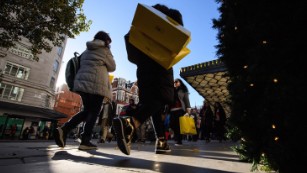May, whose government has been accused of "muddled thinking" over Britain's exit from the European Union, is expected to lay out her vision when she addresses ambassadors and high commissioners from across the globe on Tuesday.
May is expected to cite the government's determination to create a new relationship with Europe while appealing for unity at home.
"One of the reasons that Britain's democracy has been such a success for so many years is that the strength of our identity as one nation, the respect we show to one another as fellow citizens, and the importance we attach to our institutions means that when a vote has been held we all respect the result," May is expected to say in her speech on Tuesday.
"The victors have the responsibility to act magnanimously. The losers have the responsibility to respect the legitimacy of the result. And the country comes together.
"And that is what we are seeing today. The overwhelming majority of people -- however they voted -- say we need to get on and make Brexit happen. Business isn't calling to reverse the result, but planning to make a success of it. And the House of Commons has voted overwhelmingly for us to get on with it too.
"So the country is coming together. Now we need to put an end to the division and the language associated with it -- Leaver and Remainer and all the accompanying insults -- and unite to make a success of Brexit and build a truly Global Britain."
Will May seek 'hard Brexit'?
News of May's speech comes on a day where Sunday newspapers have claimed the government will call for a "hard Brexit," leading to the UK withdrawing from the single market and European customs union.
Such a move would enable the UK to regain control of its borders while also ensuring it is no longer beholden to the European Court of Justice.
Downing Street refused to comment on the claims.
May has been insistent that the the UK will trigger Article 50 by the end of March, a process which will allow for exit negotiations with the other 27 member EU states to begin.
Criticism of May
May has faced criticism from rivals over her Brexit strategy and was dealt a further blow earlier this month when
Ivan Rogers, Britain's ambassador to the EU, resigned from his role in Brussels.
"We do not yet know what the government will set as negotiating objectives for the U.K.'s relationship with the EU after exit," Rogers
wrote in a goodbye note to staffers, while also accusing Whitehall of "muddled thinking."
May rejected that assertion swiftly during her first interview of 2017 last week.
"Our thinking on this isn't muddled at all," she told Sky News.
"There hadn't been any plans made for Brexit so it was important for us to take some time to actually look at the issues, look at the complexity of the issues."
Rogers' resignation came just weeks after Michel Barnier, the EU's chief Brexit negotiator, warned Britain it was facing a race against time to strike an exit deal.
Barnier said the process would need to be completed by October 2018, ensuring enough time for ratification by the 27 remaining member states within the two-year time scale according to EU rules.
Brexit secretary: We want EU to succeed
But writing
in the Sunday Times, Brexit secretary David Davis insisted the UK government was aiming to create a "strong new partnership" with the EU.
"It is absolutely in our interest that the EU succeeds," he wrote.
"So that has been one of my key messages: we don't want the EU to fail, we want it to prosper politically and economically, and we need to persuade our allies that a strong new partnership with the UK will help the EU to do that."

